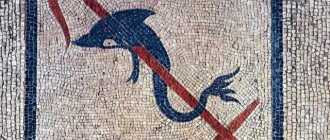Childhood and adolescence
Origen was born into a pious Christian family, presumably in 185 or 186, in Egypt, in Alexandria.
Origen's father, the grammarian Leonidas, died for his belief in the persecution of the North when his son was not yet seventeen years old. From childhood, Origen stood out for his academic success and high self-discipline. Both natural talents and good parental upbringing had an effect. Along with general education subjects, he studied the Holy Scriptures especially carefully, memorizing certain passages by heart. At the same time, Origen was not content with a superficial perception of the text, but sought to comprehend the depth of the content, asking his father serious questions that were not childish, which put him in a difficult position. It happened that Leonid told his son to be content with a simple, obvious meaning, meanwhile, in the depths of his heart, of course, he rejoiced at his curiosity and thanked God.
From a young age, Origen attended classes at the Alexandria Catechetical School, glorified by the works of Panten and Clement.
After his father was taken into custody during the persecution of the Church, Origen became inflamed with even greater zeal for the Lord. The mother, knowing how much her son neglected danger, more than once begged him to have pity on her maternal feelings. It happened that she hid clothes from him, trying to keep them to herself. Moved by a fiery impulse, Origen wrote to his father, urging him not to renounce his thoughts out of fear for his family.
After Leonid suffered martyrdom, the family's property was confiscated, leaving her without a livelihood. During this period, Origen found shelter with a noble woman who sympathized with him. Everything would be fine, but this woman showed attention to heretics. Origen shunned the prayer meetings held in her house and after some time left it.
After the death of his father, Origen continued to improve his educational level. And soon he began teaching grammar privately. In this way he earned money to support his orphaned family.
List of selected works
Author of more than 2000 works.
- Hexapla
- Against Celsus
- Two Discourses on the Song of Songs
- About the beginnings (in 4 books or parts)
- Commentary on the Gospel of John
- Commentary on the Gospel of Matthew
- About prayer
- Letter to St. Gregory the Wonderworker (Bishop of Neocaesarea)
- Letter to Julius Africanus
- Treatise on Demons
- Exhortation to Martyrdom
- Homilies
- Scholium
- Dialogue with Heraclitus
- About resurrection
- Tetrapla
Origen's activities as a Christian teacher
When, as a result of persecution, the Alexandrian Catechetical School lost its leader, many, driven by the desire to comprehend the truths of Christian doctrine, began to turn to Origen for help.
The young teacher's fame grew every day. In addition to his education, his behavior also contributed to this: he, not fearing the threats of idolaters, as if challenging them, regularly visited Christian prisoners, was present when the sentences were announced, and courageously accompanied them to the places of execution. The pagans more than once tried to organize attacks on the meetings organized around Origen, and he was forced to change the places of such meetings.
Bishop Demetrius of Alexandria, appreciating the zeal and abilities of the young teacher, officially called him and offered him the position of head of the Catechetical School in Alexandria.
Origen accepted the offer. He sold the books he had accumulated with great difficulty. The man who acquired them began to pay him four ovols daily, which at that time was the wages of an ordinary day laborer. A strict ascetic life allowed him to be content with such a small amount.
In general, Origen voluntarily and consciously strove for poverty. One might say that he lived in “holy poverty.” Origen slept right on the bare ground, ate little, and walked barefoot. The students more than once expressed their readiness to share their property with him, but Origen responded with a categorical refusal. He really took Christ’s call to heart to leave everything and follow Him.
According to legend, Origen subjected himself to voluntary castration. It is believed that he decided to take this difficult step by literally taking the words of the Redeemer about eunuchs (Matthew 19:12). Meanwhile, there is reason to believe that he did this in order to ward off possible suspicions of illicit relationships with women who were part of his circle of students.
Around 211-212, Origen, driven by a good desire to see the “most ancient Church,” went to Rome, and upon returning from this trip he again devoted himself to teaching.
At some point, due to the large number of people announced, he was forced to take on an assistant. The choice fell on Herakles, the brother of Plutarch, who accepted death for Christ. Since then, Herakles taught primary knowledge to beginners, and Origen himself taught a more prepared audience.
Over time, Origen's fame began to attract philosophers and even heretics who wanted to know his opinion on this or that issue.
Around 212 or 213, the Providence of God brought Origen and Ambrose together. Before they met, Ambrose was an adherent of one of the Gnostic sects. Origen managed to find the right words and turn him to Light and Truth. Soon a partnership began between them. By mutual agreement, Ambrose organized the recording of Origen's speeches and assumed the material costs. At the same time, he received the right to dispose of the compiled manuscripts. In addition to cursive writers, Ambrose kept scribes who replicated texts for distribution.
Around 214, Origen, with the blessing of Bishop Demetrius, undertook a trip to Arabia, where he was invited by the local prefect. He stayed in Arabia for a relatively short time.
Origenism
Main article: Origenism
Epiphanius of Cyprus, a convinced opponent of John Chrysostom, Bishop Theophilus of Alexandria[17], on the contrary, saw in Origen the source of all kinds of heresies and ca. 375 subjected his “freethinking” to systematic criticism. The translation into Latin of Origen's treatise “On the Elements” by Rufinus, completed at the end of the 4th century, caused a fierce dispute with Blessed Jerome (who initially called Origen the greatest theologian since the time of the apostles).
After Jerome’s anti-Origen attacks, orthodox theologians sharply condemned Origen for his heretical opinions (the doctrine of apocatastasis) and for including in the Christian dogma theses of ancient philosophy that were incompatible with it (in particular, Plato’s doctrine of the pre-existence of souls). However, it was not possible to exclude the influence of Origen's philosophical system.
At the end of the 4th century, Origenism was represented by the movement of the "Long Monks", who became victims of the intrigues of the Archbishop of Alexandria Theophilos in the fight against John Chrysostom. The monks, who disagreed with Theophilus’s wasteful lifestyle and despotism, left Alexandria and began to wander around Egypt and Palestine. As a result, persecuted from everywhere, they came to Constantinople to ask for help from Patriarch John Chrysostom.
In the 6th century, the Origenist movement revived in the Palestinian New Lavra, which prompted Emperor Justinian the Great to issue an edict in 543, in which Origen was declared a heretic, and the local council of the Church of Constantinople in 553 conciliarly condemned Origen and extended the condemnation of Origenism to Evagrius and Didymus.
The fate of the citadel of Origenism, the New Lavra, was decided by the protege of Emperor Justinian, Patriarch Eustochius. Eustochius demanded military force, and the New Lavra was cleared and then settled in 555 by 120 Orthodox monks from the Mar Saba monastery and other monasteries.[18]
At the Fifth Ecumenical Council, Origen and all who do not wish to anathematize him are anathematized:
We ourselves, having the commandment to edify the people with sound doctrine (Titus 2:1) and to speak in our hearts to Jerusalem (Isaiah 40:2), that is, to the Church of God, hasten to sow worthily in righteousness (Hosea 2:23), gathering the fruit of life and kindling for ourselves the light of knowledge from the Divine Scriptures and the teachings of the holy fathers. We considered it necessary to briefly outline point by point both the preaching of the truth and the condemnation of heretics and their wickedness. […] 11. If anyone does not anathematize Arius, Eunomius, Macedonius, Apollinaris, Nestorius, Eutyches and Origen, with their wicked writings, and all other heretics who were condemned and anathematized by the holy Catholic and Apostolic Church and the holy four aforementioned councils, and those who have philosophized or are philosophizing like the above-mentioned heretics, and continued in their wickedness until death: let him be anathema.[19]
Origen's condemnation was confirmed by the Sixth Ecumenical Council[20].
At the Lateran Council of 649, all of Origen's writings were anathematized, and those who did not wish to anathematize and reject works in defense of Origen were also anathematized:
If anyone does not reject and, in agreement with the Holy Fathers, with us and with faith, does not anathematize with soul and mouth all those whom the holy, catholic and apostolic Church of God (that is, the five Ecumenical Councils and all the Fathers of the Church unanimously recognized by them) rejected and anathematized along with their writings, to the very last line, as wicked heretics, namely: […] Origen, Didymus, Evagrius and all the other heretics taken together […]. So, if anyone does not reject and anathematize the wicked teaching of their heresy and what was wickedly written by anyone in their favor or in their defense, as well as the mentioned heretics themselves […]: let such a person be anathema. [21][22]
Despite official condemnation, Origen's works do not disappear from the theological bibliography. There is a study of the heretical theologian in medieval works, his influence is noticeably felt in the works of John Scotus Eriugena, and during the Renaissance, interest in the cyclical concept of time and the development of other metaphysical views of Origen naturally increase[12].
Origen was the favorite writer of the 18th century religious philosopher Grigory Skovoroda. Skovoroda’s follower Vladimir Solovyov was also keen on Origen’s ideas, adopted and applied Origen’s allegorical method in many of his works. An interesting book about Origen was written by one of the founders of the church historical school, V.V. Bolotov, in which he analyzed Origen’s teaching on the Trinity. Such Russian theologians as D. A. Lebedev[23], V. N. Lossky, L. P. Karsavin, G. V. Florovsky and others wrote about Origen. One of the founders of Slavophilism, A. S. Khomyakov, referred to Origen’s principles of love and discord, expressed respectively in church and secular history. In the 70s of the 19th century, the Russian writer N. S. Leskov was fascinated by Origen, who worked on the translation and publication of Origen’s book “On the Principles” in Russian.[24]
Origen's activities in Palestine
After popular unrest broke out in Alexandria, which was suppressed by the authorities, the city was plundered by soldiers, and then the newcomers were expelled from it. Ambrose, being an Antiochian and forced to leave Alexandria, moved to Caesarea in Palestine. During this period, Origen also moved to Caesarea.
Here he established relations with the clergy, including the Bishop of Caesarea, Theoctistus. Due to respect and trust, Origen, as a Christian teacher, was given the opportunity to preach publicly in the Church. Having learned about this, Bishop Demetrius of Alexandria was indignant. In his message to the local church leadership, he insisted that it was not appropriate for a layman to preach in the presence of bishops. In their response message, the bishops objected and reminded Demetrius that even the apostles attracted people from the people who were capable of preaching.
Soon Bishop Demetrius, needing Origen as a teacher, sent people for him and demanded his immediate return. Origen, obeying the will of the bishop, returned to Alexandria.
A few years later (probably around 230), Origen was sent by Bishop Demetrius to Greece, with instructions on church affairs. During this period, another event occurred that caused indignation in Demetrius.
Either out of old memory, or due to some other reasons, Origen laid out his route through Palestine and stayed there. Bishops Alexander and Theoktist gave him a warm, hospitable welcome. Moreover, remembering past misunderstandings associated with Origen’s preaching (as a layman), he was ordained a priest.
Bishop Demetrius, who was initially amazed at Origen's decision to subject himself to emasculation, and as if he did not see anything contrary to piety in this, suddenly spoke of this as a canonical obstacle to the priesthood.
There is reason to believe that Demetrius felt banal envy towards Origen. In 231 he initiated the convening of the Council. Egyptian bishops and Alexandrian priests were present at the Council. The ruling they made regarding Origen was quite harsh: he was removed from teaching and prohibited from living in Alexandria. The next Council, convened a few months later, declared the ordination of Origen to the presbyter illegal.
Subsequently, Origen lived and worked in Palestine under the patronage of friends. After the death of Demetrius, Herakles took over the See of Alexandria, and Origen expected a change in attitude towards him, but his expectations did not come true.
The Theological School founded by Origen in Caesarea soon became one of the centers of education. Origen's fame even reached the imperial court. Emperor Alexander's mother, Mammea, invited him to her place, wanting to listen to his speech.
The last period of Origen's life was full of preaching and literary activity.
During the next persecution against the Church, launched during the reign of Decius, Origen was captured and imprisoned. He had to experience humiliation and torture for Christ. A chain was placed around his neck, and his legs were stretched on a special tool for many days. In addition, Origen was threatened with burning. He survived and even gained freedom, but the consequences of the torment were so painful that he died. This happened in 253 or 254.
Notes
- Origen // Newest philosophical dictionary / Comp. and general ed. A. A. Gritsanov. — 3rd ed., corrected. — Mn.: Book House. 2003. - 1280 p.
- ↑ 12
Origen // Encyclopedia “Religion” / Comp. and general ed. A. A. Gritsanov, G. V. Sinilo. — Mn.: Book House, 2007 - Spassky A. A. Origen / History of dogmatic movements
- XVI. Origen. Alexandrian and Antiochian schools of Christian thought // Dvorkin A. L. Essays on the history of the Ecumenical Orthodox Church
- Epiphanius of Cyprus. Creations, part 3. - M., 1872. - 301 p. Heresies 57-66 p. 80
- Alexandria Cathedral
- Kartashev A.V. Ecumenical Councils. - M.: Republic, 2004. - P. 351
- Kartashev A.V. Ecumenical Councils. - M.: Republic, 2004. - P. 353
- Origen // Men A. V. Bibliological dictionary: in 3 volumes - M.: Alexander Men Foundation, 2002.
- Evagrius Scholasticus. Church History. Book 4. p. 38
- Origen "On the Beginnings" (Book 1)
- ↑ 1234
Lecture 9-10. Alexandria School: Clement and Origen // Kazakov M. M. Patristics (3rd year). Archived from the original on November 4, 2013. - Origen. About the beginnings / Transl. N. Petrova. - Novosibirsk, 1993. - P. 307-308.
- Origen. About the beginnings / Transl. from lat. - St. Petersburg: Amphora, 2000. - P. 353
- ↑ 123
Kuraev A.V. Early Christianity and the transmigration of souls - Origen. Against Celsus
- Socrates Scholastic Church History - M.: ROSSPEN, 1996. - P. 252
- Kartashev A.V. Ecumenical Councils. - M.: Republic, 2004. - P. 356
- Acts of the Ecumenical Councils, published in Russian translation at the Kazan Theological Academy. - T. 5. - 4th ed. - Kazan: Kazan Theological Academy, 1913. - 320 p., 8th collection, p. 211, 214
- Acts of the Ecumenical Councils, published in Russian translation at the Kazan Theological Academy. - T. 6. - 3rd ed. - Kazan: Kazan Theological Academy, 1908. - 308 p., act 18, p. 219
- The Acts of the Lateran Synod of 649. - Liverpool: Liverpool University Press, 2014. - Translated Texts for Historians, 61. P. 381, 382
- Larcher J.-C. Christological question. Regarding the project of uniting the Orthodox Church with the Pre-Chalcedonian Churches: unresolved theological and ecclesiological problems (translated from the French hieromonk Savva (Tutunov)) // Theological Works, 41. pp. 175-176
- Lebedev D. A. Saint Alexander of Alexandria and Origen. Kyiv, 1915
- Rovner A. Christianity at the Crossroads of the Ages: Origen versus Celsus Archived copy dated April 25, 2011 on the Wayback Machine
Editions of essays
Originals
- Origen's Philokalia - selected works compiled in the 4th century.
- Selected works were published by de la Roux (4 volumes, 1733-1759) (France) and Lommatzsch (25 volumes, 1831-1848) (Germany).
- Migne, Patrologia Graeca, XI—XVII, 1857
- Origenis Hexaplorum quae supersunt sive veterum interpretum graecorum in totum Vetus Testamentum fragmenta <…> ed. Frederick Field. Oxonii, 1875 (Vol. I, Vol. II); reprint: Hildesheim: G.Olms, 1964.
- Greek Text of Commentary on the Gospel of John (1896): Volume I; Volume II.
Translations
English translations:
- English translations of Origen's works
- Against Celsus (books 2-8), English translation 1869.
Old Russian translations:
- About prayer / Transl. N. Korsunsky. - Yaroslavl, 1884. - 178 p.
- Exhortation to martyrdom / Trans. N. Korsunsky. - Yaroslavl, 1886. - 80 p.
- Origen
. On prayer and Exhortation to martyrdom / Trans. N. Korsunsky. - St. Petersburg, 1897. - 240 p. reprint: St. Petersburg, 1992.
. Vol. 1. About the beginnings / Transl. N. Petrova. — Kazan: Kazan. spirits acad., 1899. - 504 p.
- reprint: Samara: Ra, 1993. - 320 p. — 50,000 copies. ( and other reissues
)
. Against Celsus. Part 1. Book. 1-4. / Per. L. Pisareva. - Kazan, 1912. - XXX+482 p.
- reprint: M.: Educational and information ecumenical center ap. Pavla, 1996.
. Exhortation to martyrdom (p. 36 ff.). From the treatise “On Prayer”: Instructions on Prayer (p. 67 ff.). Interpretation of the prayer “Our Father” (p. 79 ff.) / Trans. N Korsunsky; From the treatise “On the Beginnings” (p. 125 seq.). Letter to St. Gregory the Wonderworker (p. 157 seq.). / Translated by N. Sagarda.)
New Russian translations:
- Origen
. Interpretation of the Gospel of St. John. Book I / Per. A. Tsurkan. - Origen
. Commentary on the Gospel of John (vol. I, chapters I-XX) / Trans. and preface A. G. Dunaeva // Theological works. Sat. 38. - M., 2003. - P. 97-119. - Origen
.
Commentaries on the Gospel of John. Book 6 / Per. O. Kulieva // Origen
. About the beginnings. - St. Petersburg: Amphora, 2007. - Origen
. Interpretation of the Gospel of John / Trans., comm. and preface O. I. Kulieva. - St. Petersburg: Publishing House of the Russian Chemical Academy, 2021. - Origen
. Homilies on Genesis / Trans. from lat. and ancient Greek, preface. and approx. M. V. Asmus. - M.: Publishing House "Poznanie", 2021. - 308 p.
Literature
in Russian
- Bolotov V.V.
Origen’s teaching on the Holy Trinity. - St. Petersburg, 1879. - 452 p. - Eleonsky F. G.
Origen’s teaching about the Divinity of the Son of God and the Holy Spirit and about Their relationship to the Father. - St. Petersburg, 1879. - 176 p. - Ermishin O. T. P.
A. Florensky and Origen (the problem of metaphysics) // Philosophical Sciences. 2002. - No. 6. - Origenism and Origen // Kartashev A.V.
Ecumenical Councils. - Kireeva M.V.
Origen and St. Cyril of Alexandria: interpretations of the Gospel of John: exegetical methods. - St. Petersburg: Aletheya, 2006. - 191 p. — ISBN 5-89329-900-0. (Series “Byzantine Library. Research”). - Lebedev N.I.
The work of Origen against Celsus. Experience of research on the history of the literary struggle of Christianity with paganism. - M., 1878. - Nesterova O. E.
Allegoria Pro Typologia: Origen and the fate of allegorical methods of interpreting Holy Scripture in the early patristic era. - M.: IMLI RAS, 2006. - 293 p. — ISBN 5-9208-0258-8. - Savrey V. Ya
. Alexandrian school in the history of philosophical and theological thought. - M.: KomKniga, 2006. - P. 419-547. — ISBN 5-484-00335-0. - Seregin A.V.
The hypothesis of the plurality of worlds in Origen’s treatise “On the Beginnings.” - M.: Institute of Philosophy of the Russian Academy of Sciences, 2005. - 197 p. — ISBN 5-9540-0035-2. - Solovyov V.S.
Origen, Christian theologian and philosopher // Encyclopedic Dictionary of Brockhaus and Efron: in 86 volumes (82 volumes and 4 additional). - St. Petersburg, 1890-1907. - Filevsky I. I.
Celsus and Origen. - Kharkov, 1910. - Tsurkan A.V.
Origen: the problem of interaction between religion and philosophy. - Novosibirsk: 2002. - ISBN 5-95356-056-4 (erroneous). - Rubtsov D. A.
Interpretations of the theological heritage of Origen in Russian Origenianism // Christian reading. 2021. - No. 1. - P. 127‒140. - Exaples // Encyclopedic Dictionary of Brockhaus and Efron: in 86 volumes (82 volumes and 4 additional ones). - St. Petersburg, 1890-1907.
in other languages
- Frederick Field's prolegomena to Origenis hexaplorum quae supersunt, sive veterum interpretum Graecorum in totum Vetus Testamentum fragmenta. Translated and annotated by Gérard J. Norton; with the collaboration of Carmen Hardin. Paris: J. Gabalda, 2005 (= Cahiers de la Revue biblique, 62) (English translation of F. Field's Latin text, from his 1875 Oxford edition of Origen)
- Nautin P.
Origène: sa vie et son œuvre. - Paris: Beauchesne, 1977. - 474 p. - (Christianisme antique 1).






